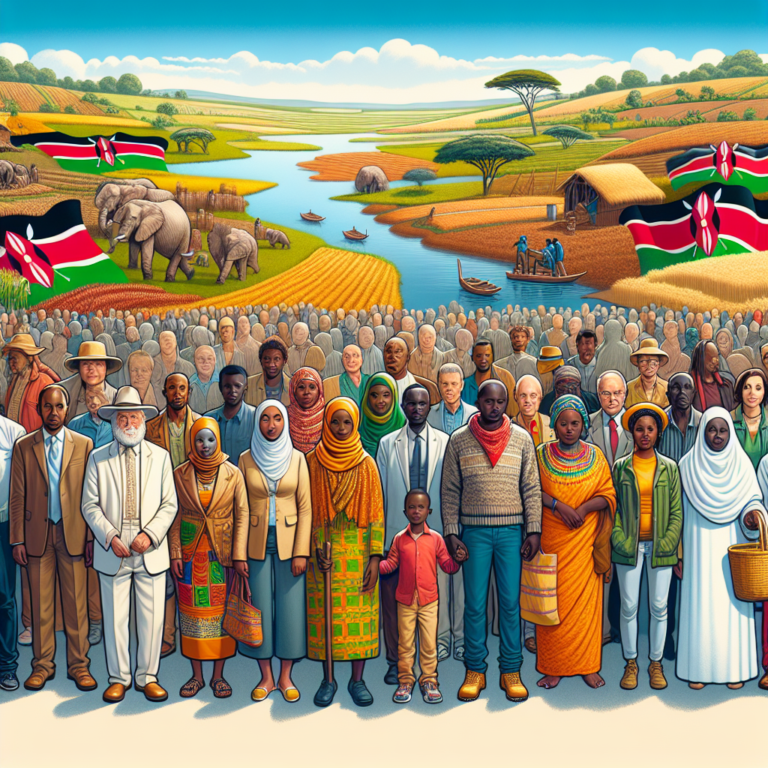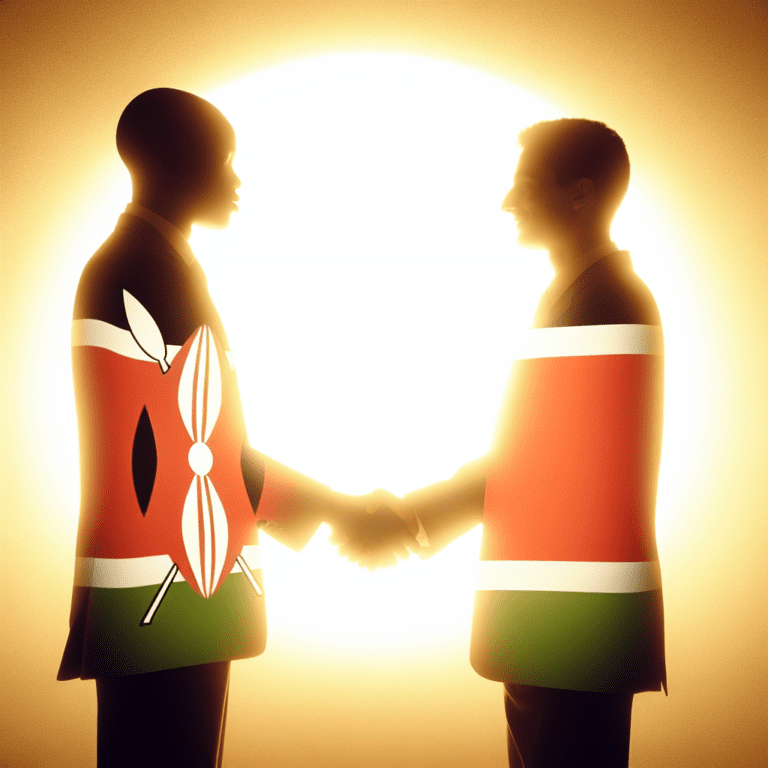What Was The Role Of The Kenyan African National Union (KANU) In Kenya’s Politics?
Are you curious about the role of the Kenyan African National Union (KANU) in Kenya’s politics? Well, look no further! In this article, we will explore the significant contributions and influence that KANU had on the political landscape of Kenya. From its formation to its dominance in government for over 40 years, KANU played a pivotal role in shaping the country’s policies, ideology, and leadership. So, let’s dive into the intriguing history and impact of KANU on Kenya’s political development.
Formation of KANU
1.1. Background of KANU formation
The Kenyan African National Union (KANU) played a significant role in shaping Kenya’s political landscape. The party was formed in May 1960, in response to the growing demand for political liberation from colonial rule. At the time, Kenya was a British colony, and the indigenous population was seeking independence and self-governance. The formation of KANU was a result of efforts to unite various ethnic communities under a common political platform, with the ultimate goal of achieving independence.
1.2. Founding members of KANU
KANU was founded by a group of influential leaders, including Jomo Kenyatta, who later became the first President of Kenya. Other prominent founding members included Tom Mboya, James Gichuru, and Joseph Murumbi. These leaders came from different regions and communities within Kenya, emphasizing the party’s commitment to inclusivity and cross-ethnic collaboration. Their vision was to create a united front that could effectively challenge British colonial dominance and pave the way for an independent Kenya.
KANU’s Domination
2.1. Early electoral successes of KANU
After its formation, KANU quickly gained popularity among the Kenyan populace, particularly in rural areas. The party successfully mobilized support through grassroots campaigns and its message of liberation resonated with the aspirations of the people. In the 1963 general elections, KANU emerged as a dominant force, winning a majority of seats in the Legislative Council and securing Jomo Kenyatta’s position as the Prime Minister.
2.2. Consolidation of power
In the years following Kenya’s independence in 1963, KANU solidified its position as the ruling party. The party used its organizational strength and broad-based support to establish control over key government institutions, including the judiciary and civil service. This consolidation of power enabled KANU to implement its policies and agenda, shaping the course of Kenya’s development in the decades that followed.
2.3. One-party rule under KANU
In 1964, KANU transformed into a single-party system, effectively eliminating political pluralism. The one-party rule meant that KANU was the only legally recognized political party in Kenya. While this arrangement initially provided stability and cohesion, it also limited political freedoms and stifled dissent. KANU’s dominance and control often led to accusations of authoritarianism and undermined the principles of democracy.
KANU’s Ideology
3.1. Pan-Africanism and anti-colonial struggle
One of the key ideological pillars of KANU was Pan-Africanism. The party saw itself as part of a broader movement for African liberation and unity. KANU leaders championed the cause of anti-colonial struggle, drawing inspiration from other African countries that were fighting for independence. The party’s commitment to Pan-Africanism resonated with many Kenyans, who saw the liberation of their country as an essential part of a larger continental movement.
3.2. African socialism and Harambee philosophy
Under Kenyatta’s leadership, KANU embraced the principles of African Socialism. This ideology aimed to promote economic development, social justice, and equity through state intervention and collective responsibility. Harambee, a Swahili term meaning “pulling together,” became the guiding philosophy of KANU. It emphasized community participation in development initiatives and collective effort towards nation-building. The Harambee philosophy emphasized the importance of self-reliance, volunteerism, and solidarity among Kenyans.
Economic Policies
4.1. Import substitution industrialization
In the early years of independence, KANU implemented import substitution industrialization policies. This approach aimed to reduce Kenya’s reliance on imported goods by fostering domestic industries. The government provided incentives and protectionist measures to promote local manufacturing and reduce the country’s trade deficit. While these policies initially had some success in stimulating industrial growth, they also led to inefficiencies and a lack of competitiveness in the long run.
4.2. Promotion of agricultural sector
Agriculture played a crucial role in Kenya’s economy during KANU’s rule. The government implemented policies to promote agricultural development and increase productivity in the sector. Key initiatives included the provision of subsidized inputs, extension services, and the establishment of agricultural cooperatives. These efforts aimed to improve the livelihoods of small-scale farmers and enhance food security in the country. However, challenges such as land distribution, access to credit, and high production costs hindered the full realization of the sector’s potential.
4.3. Development of infrastructure
KANU prioritized infrastructure development as a key driver of economic growth. The government invested heavily in the construction of roads, railways, airports, and seaports to connect different regions and facilitate trade. These infrastructure projects aimed to improve transportation, promote regional integration, and attract foreign investment. While they contributed to the overall development of Kenya, concerns were raised about the sustainability of these projects and the heavy reliance on external borrowing to fund them.
Relationship with Tribal Politics
5.1. KANU as the Luo community’s party
Although KANU aimed to be a multi-ethnic party, it had a close association with the Luo community, primarily due to Jomo Kenyatta’s ethnic background. Kenyatta himself was a Luo, and his leadership of KANU appealed to many Luo people who saw him as a representative of their interests. This association led to a perception that KANU favored the Luo community over others, which created tensions and divisions among different ethnic groups.
5.2. Challenges of ethnicity in KANU’s politics
Ethnicity has been a prominent feature of Kenyan politics, and KANU was not immune to its influence. While the party aimed to foster national unity, it often faced challenges in managing ethnic tensions within its ranks. The concentration of power and resources within KANU led to accusations of favoritism towards certain communities, which fueled resentment and dissatisfaction among others. These ethnic divisions and the politicization of ethnicity became significant challenges to KANU’s governance and contributed to social and political unrest in Kenya.
Political Opponents and Oppression
6.1. Opposition parties and suppression
During KANU’s rule, opposition parties faced significant challenges and suppression. The one-party system limited political pluralism, making it difficult for opposition parties to gain a foothold. KANU utilized various tactics, including censorship, intimidation, and restrictions on political activities, to maintain its hold on power. The suppression of political opponents and the silencing of dissenting voices eroded democratic principles and hindered the development of a vibrant multiparty democracy in Kenya.
6.2. Challenges to KANU’s rule
Despite the oppressive environment, there were persistent challenges to KANU’s rule. Civil society organizations, trade unions, student movements, and grassroots activists played a crucial role in challenging the government’s policies and demanding accountability. These movements often faced repression and crackdowns from the authorities, but they played a vital role in exposing corruption, advocating for human rights, and pushing for political reforms.
6.3. Impact of single-party era on democracy
KANU’s one-party rule had a lasting impact on Kenya’s democracy. The lack of political pluralism and the concentration of power in the hands of a few stifled democratic institutions and processes. The absence of a strong opposition and checks and balances allowed for corruption and governance failures to go unchecked. It was only with the advent of multipartism in the 1990s that Kenya began to witness a gradual shift towards a more inclusive and democratic political system.
KANU and Independence Heroes
7.1. Jomo Kenyatta as the face of KANU
Jomo Kenyatta, the founding President of Kenya, became the face of KANU during his tenure. Revered as a national hero, Kenyatta was seen as the embodiment of Kenya’s struggle for independence and the leader of the ruling party. His leadership style and charisma played a significant role in galvanizing support for KANU and fostering a sense of national identity among Kenyans.
7.2. Upliftment of Kenyan identity
KANU, under Kenyatta’s leadership, championed the promotion of Kenyan national identity. The party emphasized the need to shed the divisions of ethnicity and embrace a common Kenyan identity. Efforts were made to create a sense of unity and shared destiny among the diverse ethnic communities in the country. While these initiatives had some success in fostering a national consciousness, ethnic tensions and the legacy of inequality continued to challenge the realization of a truly inclusive Kenyan identity.
Corruption and Mismanagement
8.1. Consolidation of power and corruption
KANU’s consolidation of power in Kenya created an environment conducive to corruption and mismanagement. The concentration of authority allowed for the abuse of power and the misappropriation of public resources. Allegations of corruption and nepotism plagued the government, undermining development initiatives and widening the gap between the rich and the poor. The lack of transparency and accountability within KANU’s rule hindered Kenya’s progress and eroded public trust in the government.
8.2. Economic mismanagement
KANU’s economic policies faced challenges in effectively managing Kenya’s resources. While the party implemented various development projects, there were concerns about the effectiveness and sustainability of these initiatives. Economic mismanagement, coupled with corruption, hindered the achievement of desired outcomes and contributed to persistent socio-economic inequalities. The consequences of these challenges were felt by ordinary Kenyans, who experienced limited access to basic services and opportunities for socio-economic advancement.
KANU’s Decline
9.1. Arrival of multi-party system
The 1990s saw a wave of political reforms across Africa, and Kenya was not immune to this trend. Pressure from civil society, international partners, and a desire for democratic change led to the introduction of a multi-party system in Kenya. This move posed a significant challenge to KANU’s political monopoly, as opposition parties emerged and gained momentum. The introduction of multi-party politics marked the beginning of KANU’s decline and a shift towards a more competitive and pluralistic political landscape.
9.2. Fall of KANU in the 2002 election
The 2002 general elections marked a landmark moment in Kenya’s political history. KANU faced a united opposition front, which rallied around Mwai Kibaki and the National Rainbow Coalition (NARC). The coalition capitalized on public discontent with KANU’s rule, corruption scandals, and the desire for change. NARC emerged victorious, ending KANU’s nearly four-decade-long domination of Kenyan politics. This electoral defeat marked a turning point in Kenya’s political landscape and signaled the decline of KANU as a dominant political force.
Legacy of KANU
10.1. Impact on Kenya’s political landscape
KANU’s role in Kenya’s political landscape cannot be overstated. The party shaped Kenya’s post-independence trajectory, contributing both positively and negatively to the country’s development. KANU’s dominance and subsequent decline paved the way for a more pluralistic and competitive political system. It highlighted the importance of democratic institutions, good governance, and inclusive policies in fostering national unity and equitable development.
10.2. Influence of KANU’s ideology
KANU’s ideology, rooted in Pan-Africanism and African socialism, left a lasting impact on Kenya’s political thought. The emphasis on national unity, self-reliance, and community participation continues to resonate with many Kenyans. While KANU’s policies faced criticism and challenges, they also laid the groundwork for subsequent governments to address issues of social justice, economic empowerment, and political inclusivity.
In conclusion, KANU played a pivotal role in Kenya’s political history. From its formation as a liberation movement to its ascendancy as the ruling party, KANU’s influence shaped Kenya’s post-independence trajectory. The party’s ideology, economic policies, and governance practices influenced Kenya’s political landscape for decades. While KANU faced challenges and criticism, its legacy continues to impact Kenya’s political, social, and economic dynamics.







